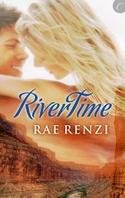
 Why are do we get hooked on fiction? What in us supports the reading habit and the huge industry that feeds it? Escapism of course.
Why are do we get hooked on fiction? What in us supports the reading habit and the huge industry that feeds it? Escapism of course.
Escapism has a bad rep. Undeservedly, in my (possibly self-serving) opinion. I think that far from being a sign of mental deterioration, it is a hallmark of adaptation.
Animals, humans included, evolve in response to stress of one kind or another. Not going deep into Darwinism here, but survival of the fittest is the basic rule. Early on, this meant those who had the skills to get food, to run off competitors, to ward off threats and to abundantly procreate won the day. (Sound familiar? The romantic hero/heroine is a prototype for successful biological adaptation.)
These days we have come up with group solutions to most of the stressors: we no longer have to chase down our food, we have laws to define our turf, police to deal with threats to life and limb, and procreation in vast numbers—no longer necessary to the survival of the species—is now frowned upon.
Along the way, we’ve collected a host of other stressors: various health woes because we don’t have to chase down our food, annoying neighbors we can’t knock off because of our protective laws. New pressures about car status and fashion faux pas, because catching food and beating off saber-toothed tigers are no longer reasonable selection criteria for mates. Bad news on a global level, far removed from our ability to intervene.
So, how do we survive these new stressors? What mechanism, what strategy is common to those who thrive in this world?
Escapism, of course. The ability to sweep these new and largely psychological threats out of one’s mind and replace them with images that are exciting and romantic (I use the term broadly: apocalyptic swashbuckling and hard-edged heroism for men is just as romantic as flowers and hearts for women) is like a reset button for beleaguered souls.
There are other benefits, too. Reading fiction gives the mind permission to roam into unfettered territory, to stretch creative muscles in an institutionalized world. It diminishes the stress of daily problems by implicit comparison to the dire situations faced by our heroes and heroines—if a teen boy can face the greatest evil in the world, can I not face a traffic ticket?
I’ve never seen a scientific study on this, but I bet dimes to dollars that, all other things being equal, people who read romantic fiction are healthier, happier and better adjusted than those who don’t. It is THE adaptive skill of the moment (in moderation, of course—Aristotle was no dummy).
And that leads to RIVERTIME, my debut novel.
The heroine of RIVERTIME, Casey Lord, embarks on a river-rafting trip for some serious escapism of her own. Instead of finding peace, she is heaved into chaos when a flash flood sweeps her away and deposits her on a rocky beach in the wilderness.
Casey’s not the only one the river captures. Jack Raines is thrown from his river raft by the flood, and washes up on the same shore. Quiet and moody, he’s as different from Casey as night is from day, but he doesn’t mind: he’s happy for an unscheduled break in his sharply tangled life—a life he’s determined to keep secret from Casey.
It should be a desperate struggle to survive until they’re rescued, but their sojourn in RIVERTIME—their term for the isolated time and space they now inhabit—takes on an altogether different feel.
But change is inevitable—it’s only a matter of time before they are rescued. They each face the prospect of return to the world in their own way: Casey reasons about what is real and what is fantasy, while Jack pretends the outside world doesn’t exist.
When their rescuers arrive, neither is prepared for what awaits them—deceit, betrayal, and danger.
RIVERTIME is a story of adventure, romance and escape from the ordinary. It is published by Carina Press, and is available now.
Comment to win a copy of RIVERTIME
To comment on Rae Renzi’s blog please click here.


No Comments
Comments are closed.